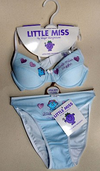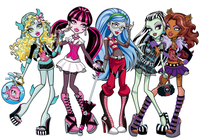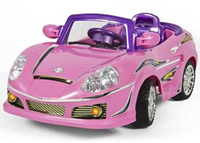This article has been co-written with Andie Fox of blue milk.
Imagine this scenario. You walk into a children's clothing store at the mall and the first thing you see is a rack of tiny padded bras targeted at girls so young and so small they do not have the slightest hint of breasts. You leave that store. You enter a nearby toy store, and as you stroll down the pink aisle, you notice a slew of dolls that are dressed for a night of raunchy burlesque instead of tree climbing or fairy dress twirling or any other activity appropriate for young girls. So you leave that store and the next one is a hobby shop. You go in looking for a remote control car that your daughter has asked for, and the young man who works in the shop tells you that there is only one car option for your daughter -- it is right there, the pink one.
This type of shopping experience is no longer questioned by the vast majority of parents. In fact, if you're a parent who does question it, it is only a matter of time before you will hear some version of "if parents didn't buy these items, no one would sell them" or "because these items sell, there is obviously a demand for them." You will be told that girls innately desire these items and so corporations are simply meeting a need. You will find yourself in the absolutely bizarre position of having your focus on corporate social responsibility for the stereotyping and sexualizing of girls hijacked and shifted with all due haste to individual parental responsibility.
With this sleight of hand comes the predictable assessment of which parents are failing girls, as opposed to which corporations are failing girls. Suddenly it becomes clear to you that parents are defending Fortune 500 toy and apparel manufacturers against other parents, because, after all, the "good" parents will manage on their own to raise healthy children despite the unscrupulous behavior of these corporate goliaths. As good parents do! And there's nothing like pointing out the bad parents to place oneself among the ranks of the good ones. It's an Olympic sport!
The line between corporations and individuals has become increasingly blurred as people have begun to associate part of their identities with their favorite brands. And when we feel defensive -- as can be the case when other parents seem to criticize us -- we are even more inclined to defend our systems and identities, which can include these brands.
Score one for the corporations. They have divided and conquered, and they're laughing all the way to the bank while parents look sideways instead of UP. They've got parents coming to bat for them the way Republicans have so many poor people voting for them, directly against their own interests.
It's also important to point out that this entire issue is one of privilege. It is inextricably bound up with socioeconomic class and parental resources. If you are a parent who has the time and money to shop for clothes and toys that send healthy messages to girls, rather than being forced to buy what is in the big box stores, then you can exercise a degree of protective control -- at least while your children are very young -- that other parents can't. And there are other reasons, too, why parents might fail to put enough sandbags along the seawall to keep the tidal wave of stereotyped and sexualized products for girls from drowning them.
What are some of those reasons?
1. Parents buy into it because they're desensitized to it.
We are immersed in a culture of gender stereotypes and commercialism, and it has dulled our sensitivities. Increasingly we reduce our identities to a very rigid gender binary. The definition is becoming extremely narrow for what is considered appropriately feminine and masculine, and there is tremendous peer pressure -- at both the child level and the adult level -- to conform to these roles. The exaggerated gender segmentation of products is greed-based because it allows companies to double their profits. Behold, a generation of children who now ask for what they've been spoon-fed since birth and told is "for" them! It's a brilliant plan that is largely invisible to most of us.
2. Parents buy into it because they're teaching their children how to fit in.
Children represent for parents, on some level, another shot at getting it right... at taking the journey through life once more, but with the wisdom bestowed by adulthood. A compliment for one's child is gratefully accepted as a compliment for oneself. Having a child successfully fit in is a measure of a parent's own ability to fit in. Even if a child must wear and play with items that make a parent uneasy, that feeling is often pushed aside for the more compelling validation garnered by having a child who is well-liked and not marching to a different beat.
3. Parents buy into it because they're too tired to fight it.
The tide of inappropriate merchandise for girls is bigger than any girl empowerment movement, let alone any individual. It is difficult for parents to continually resist it. It requires endless energy and vigilance. Parents tapping into a global anxiety about parenting decide to conserve their energies for what they perceive to be the bigger fights. Maybe for them that is keeping their children away from drugs, or getting their children through school and into secure jobs.
And you don't have to actively seek this merchandise out. The passive position -- the "do nothing" default -- will allow a sea of these items to flood into your house. Mass produced products are cheaper than specialty products, so buying affordable means buying mainstream, and buying mainstream means buying stereotypes.
4. Parents buy into it because there is a lack of public critical thought.
In contrast to the enormous capacity of marketing, how much time and money are invested in public debate about that marketing? The average parent's consumption of media greatly outweighs his or her analysis of that media. It is very difficult to question mainstream culture in isolation. Parents may feel that something is not quite right, and they can find themselves feeling apprehension about these products, but they probably won't come across anything in the magazines at the supermarket to put a language to those feelings. There are some popular attempts to question marketing, such as the clever hashtag #notbuyingit, but such efforts represent a social movement that the average beleaguered parent does not have the time to parse.
Individual parental responsibility is important. Of course it is! And parents know that. No one is trying to abdicate responsibility by saying that this thing is bigger than me and bigger than my home. Parents are buying this stuff because they're unsure, they're torn, they're tired, they're confused, and they're feeling bombarded... but be clear, they're not buying this stuff because there is an unmet demand for more gender stereotypes for their children.
If only individual parental responsibility were all it took.
Lori Day is an educational psychologist, consultant and parenting coach with Lori Day Consulting in Newburyport, MA. She is the author of the new book Her Next Chapter: How Mother-Daughter Book Clubs Can Help Girls Navigate Malicious Media, Risky Relationships, Girl Gossip, and So Much More.
Andie Fox is an economist who writes about motherhood from a feminist, political and personal perspective. She is the author of the popular blog blue milk. Fox is also one of the contributing authors of The Good Mother Myth: Redefining Motherhood to Fit Reality and The 21st Century Motherhood Movement.
 Like Us On Facebook |
Like Us On Facebook |
 Follow Us On Twitter |
Follow Us On Twitter |
![]() Contact HuffPost Parents
Contact HuffPost Parents
Also on HuffPost:


